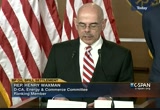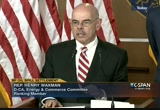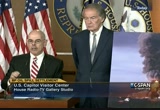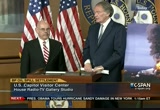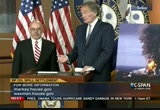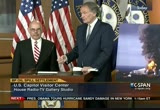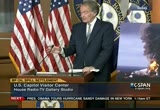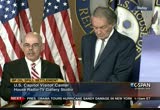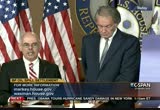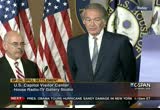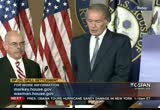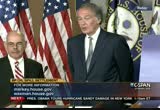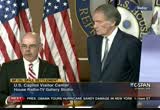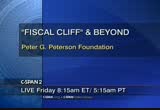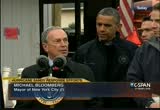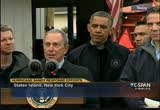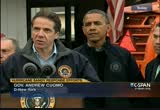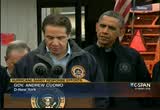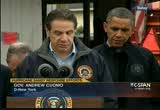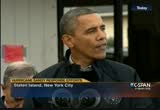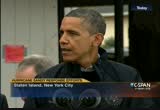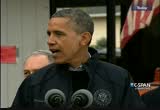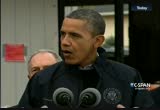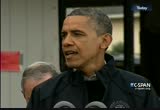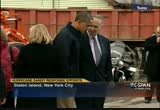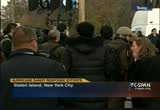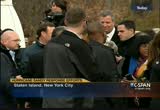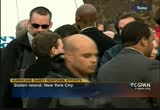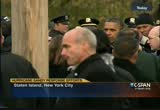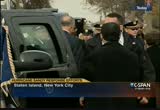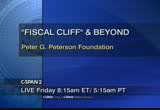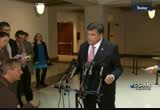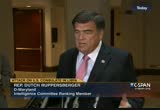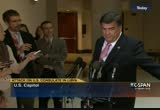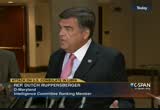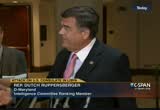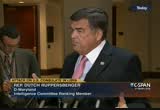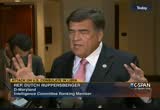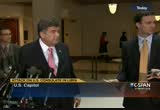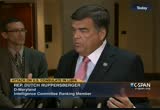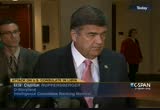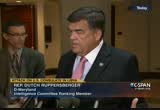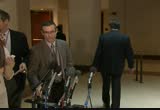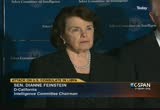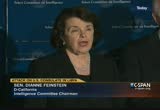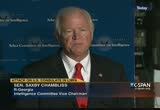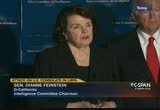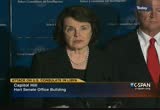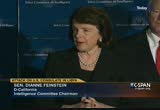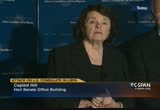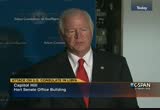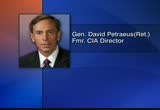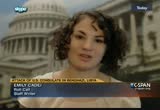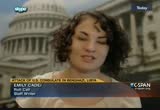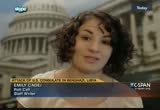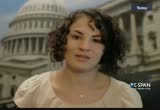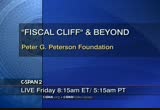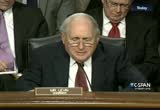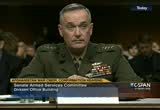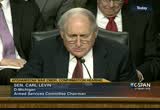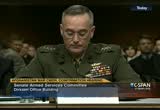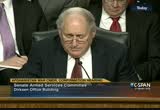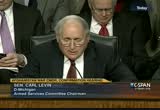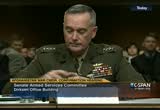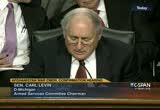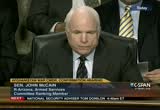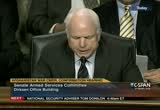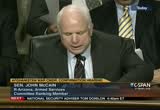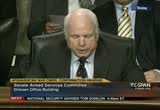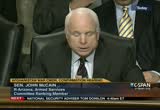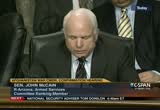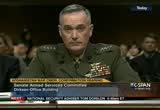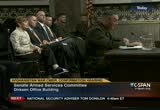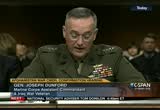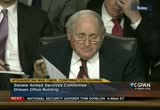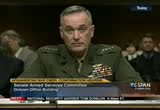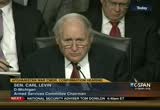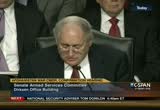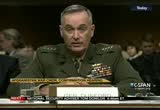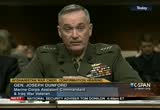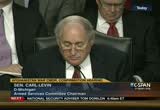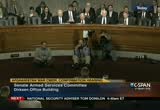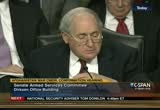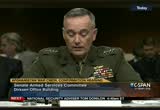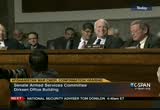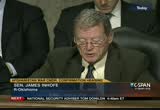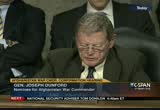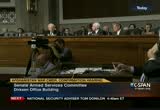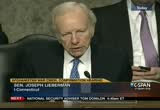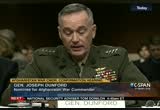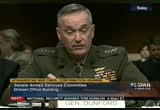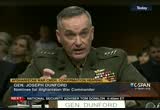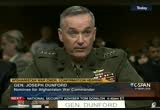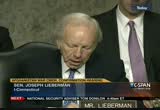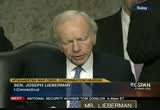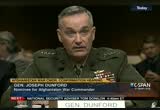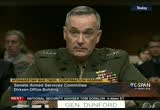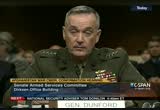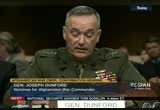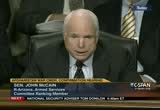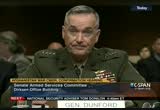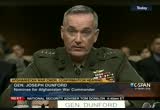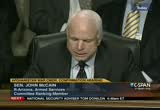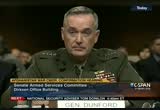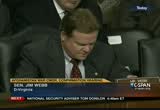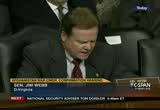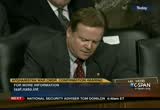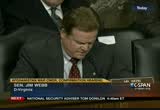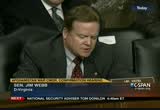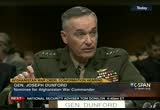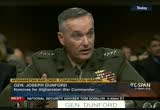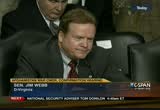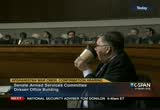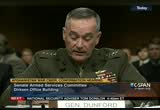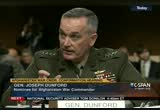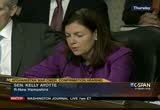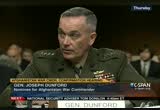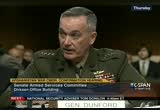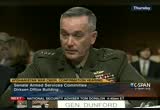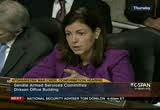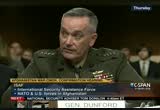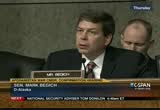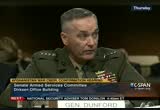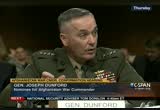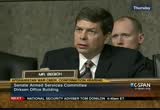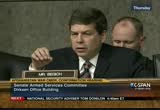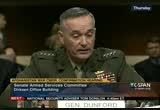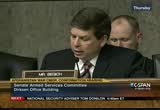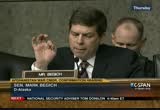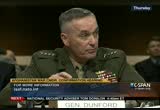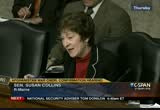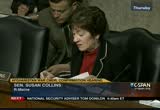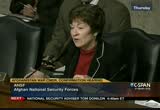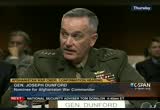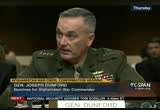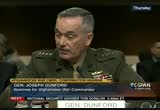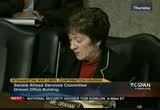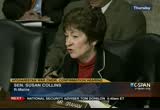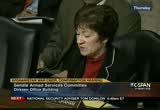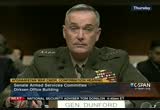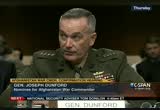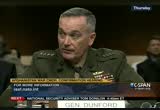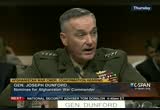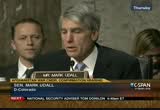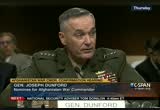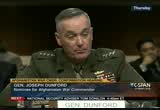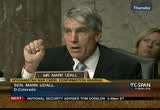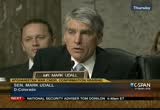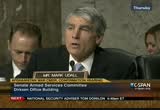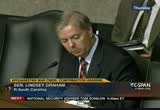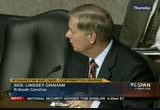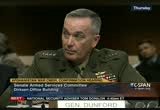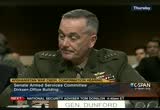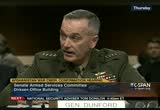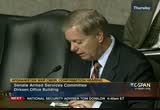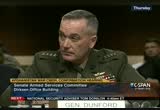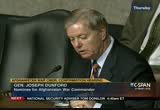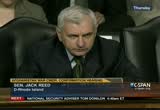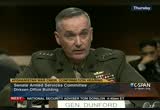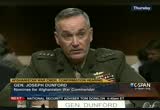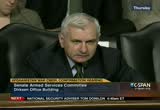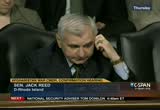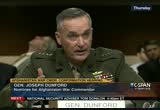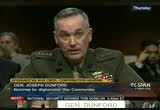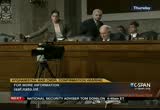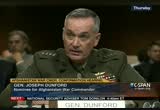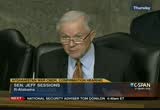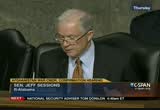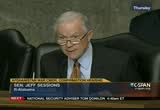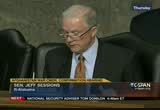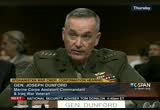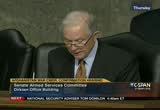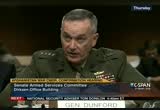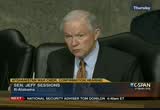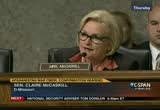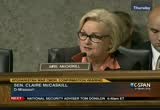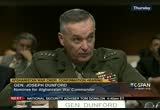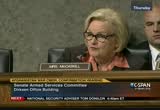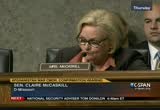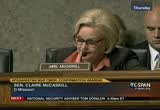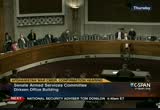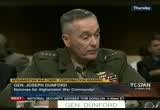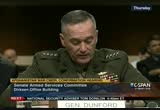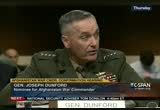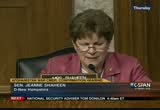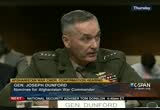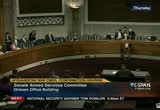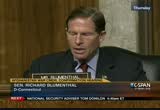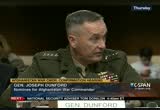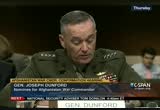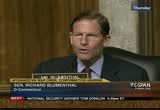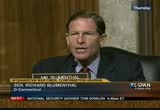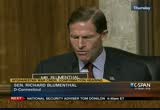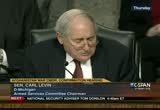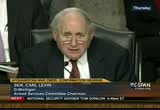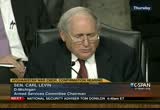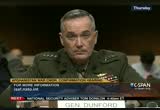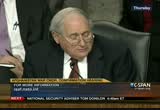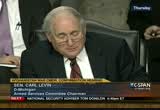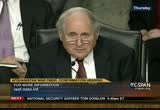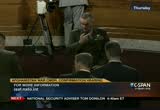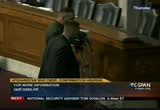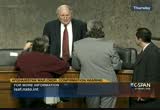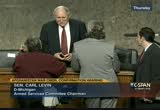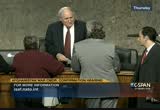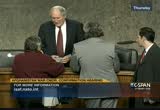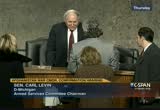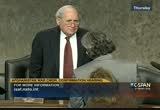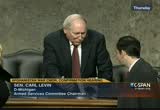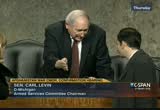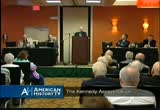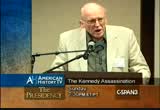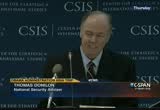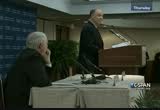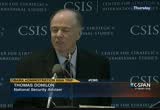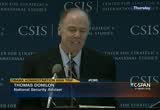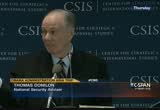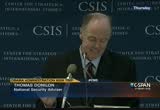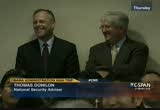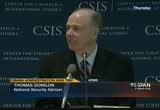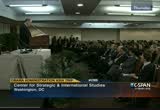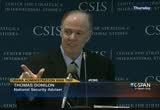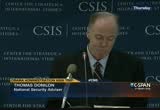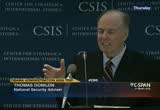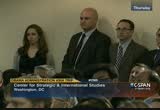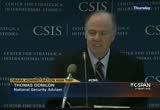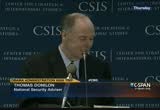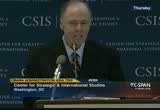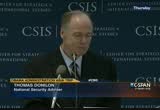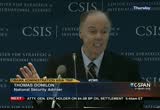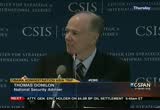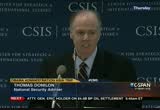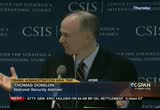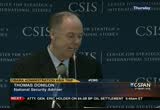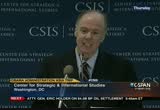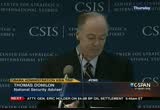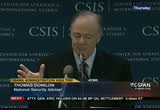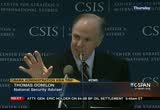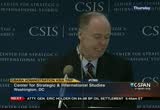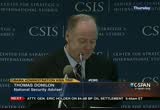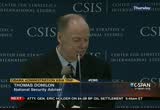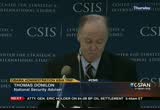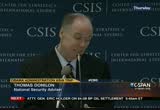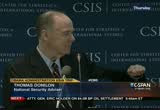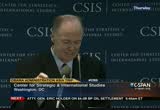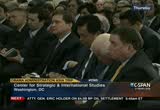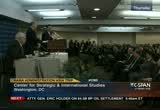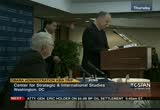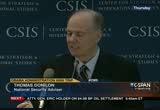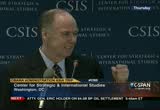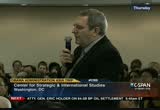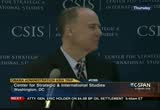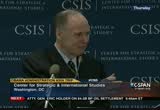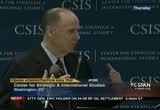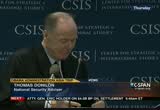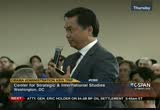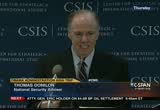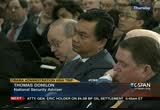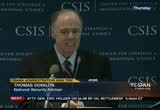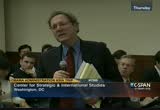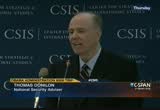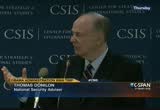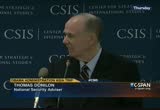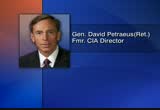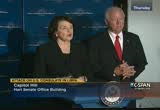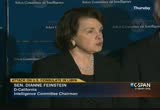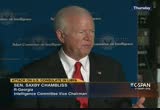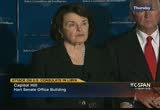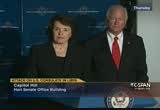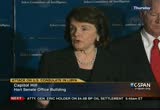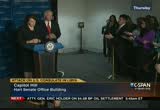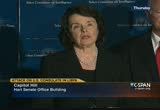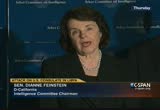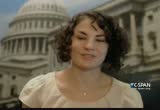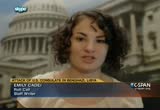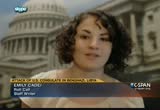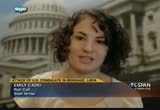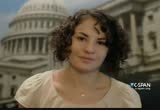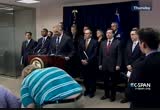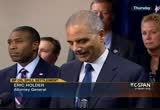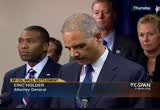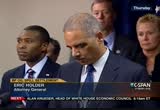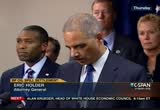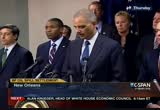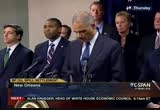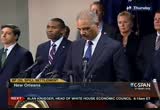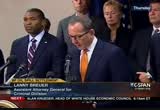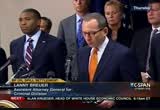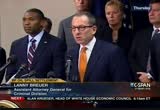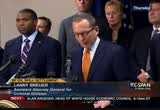tv Capitol Hill Hearings CSPAN November 16, 2012 1:00am-6:00am EST
1:00 am
measure of accountability. the department of justice has acted aggressively against bp. it is holding the company and key individuals criminally responsible. it is important to remember that this settlement does not and the process -- does not end the process. in february, 2013, a jury will determine the civil penalties that bp will face. i am hopeful that the other companies who played a role in this disaster, such as transocean and halliburton, will also face appropriate penalties for their actions. bp's actions caused the death of 11 men, caused one of the largest ecological disasters our country has ever faced. we will have the decision about the civil penalties, but there will be further actions of criminal nature against some of the individuals who have been cited in the information filed
1:01 am
by the justice department. we have not yet recovered from this disaster. the families of those who lost their loved ones will never recover. but this is an important step in making sure that bp is held the responsible -- held responsible for its action. i want to commend the work of the chairman. he aggressively pursued the statements that were made. when he heard that the amount that they were talking about discharging into the gulf was as slow as it was being presented, he knew right away that it was not accurate. he was able to give the justice department documents that led them to the same conclusion. we need to hold wrongdoers
1:02 am
accountable. i am pleased that the justice department -- and i commend the attorney general -- are taking the action to hold dp criminally accountable. they are yet to be held -- hold bp criminally accountable. they are yet to be held civilly accountable. and the individuals who gave ms. information to congress or were on board the ship on the night -- gave mis information to congress or were on board the ship on the night of the explosion -- they will have to answer to charges as well. >> you seemed to take this very personally, the fact they were lied to -- the fact you were lied to. do you? >> i was the subcommittee chairman. henry was the chairman of the whole committee. we had an emergency briefing on may 4, asking bp to give us accurate information with regard to the flow rate into the
1:03 am
gulf. the answer to that question, to a very large extent, determined what the response would be on an emergency basis, to deal with the impact of the spill in the gulf of mexico, the harm that it would do to the ocean, the harm that it would do to see life, the harm -- to sea life, the harm that it would do to all those employed in the gulf. it is now clear that bp was lying to congress. they were deliberately lowballing the number, because liability is directly tied to the number of barrels that flow into the ocean. if they are guilty of ordinary negligence, they would be charged with $1,100 per barrel. at 5,000 barrels per day, that
1:04 am
is a far smaller fine and 50,000 or 60,000 barrels project -- smaller fine than 50,000 barrels or 60,000 barrels per day. the range of the fine can number from $5 billion to $21 billion. the motive for the law is very clear -- for the lie is very clear, to minimize the overall impact on bp and the other companies in terms of their liability, if in fact that number was the higher number, which it turns out to have been. i personally take it as an insult to congress, but, more importantly, to the american people, because that is who we represent on a daily basis. we are tasked with getting the answers for the american people. when you are lying to congress, when you are lying to the energy and commerce committee, you are
1:05 am
actually lying to all of those people who are now going to bear the pain of the harm which is being done in the gold state region -- the gulf state region. >> thinking back to the time, did you know at the time -- did you have suspicions at the time that lies were being told? >> yes. we had experts who were telling us that they felt that the flow rate was much higher. we had experts who arrived who said that, if they could gain access to this billc -- to the spill cam, they would be able to determine how large the flow rate was. and determine the flow rate being more -- flow rate by being given more access to all of the different angles that the camera made it possible to
1:06 am
observe the spill. once that happened, the experts around the country who lack access to that information dramatically -- who had access to that information dramatically increased the damage they thought was being done. it was a exponentially-higher spill rate then they had represented to us on may 4, that they had represented initially in the first week after the spill, and which they had been representing subsequently after the may 4 hearing. the justice department has now obtained documents with the may 4 hearing and subsequently shows that they knew the number was much higher. >> there was a very specific charge of obstruction of congress. congressman markey is talking about that particular obstruction of congress.
1:07 am
it went beyond that. i sent a letter on june 14 to tony hayward, the chief executive officer of bp, outlining many details that we were able to discern from the documents that were given to our committee of short cuts that they took, of risks that they put in place for a possible blow out, things they should have known to do in a better way. we set that out as well. part of the criminality of bp's actions was not just misleading congress, it was not doing the things they could have done it to avoid the blackout that killed 11 people. that's why the of the individuals on board that night -- two of the individuals on board that night are being held with criminal liability personally.
1:08 am
that case is not settled. what is being settled here is the payment of a settlement for the criminal liability of bp as a corporation, which includes this obstruction of congress. the essential point is that they are being held accountable. we feel strongly, when we do an investigation, that people be required to tell us the truth. they had a lot of reasons, as ed markey pointed out, to lie. it was in their economic interests july. it was not only misleading congress. it was misleading investors who would buy or sell the stock, who were being misled as to the consequences and the costs that are being imposed by the amount of this bill itself -- of the spill itself. they acted in an irresponsible, reckless way. bp caused a tremendous disaster that cost the lives of 11 people and was probably the largest illegal logging -- ecological disaster we have seen in the united states caused by any one corporation.
1:09 am
>> how rare is it for someone to be charged with obstruction of congress? how often has that happened in your experience? >> it happens on occasion. it is also rare to have a blowout that could have been prevented happening as it did in the gulf. you have to look at all of this in its entirety, and bp is being held accountable for what they did and did not do, for the recklessness by which they operated, and then their attempt to cover it up in their testimony before the congress of the united states in order to mislead investors and members of congress and the american people. >> so, if, again, if we had known from the beginning that it was not 5,000 barrels but 50,000 barrels or 60,000 barrels, that would have
1:10 am
affected the amount of dispersants which was needed in order to break up the oil spill. it would have affected the amount of booms and skimmers that were needed in order to collect the oil. it would have affected how we use the top hat and detailed mechanisms that they had put in place initially in order to try to stop the spill. we would have understood the futility of the initial actions and substituted something that would have been much more dramatic. it delayed the response, which was put in place in order to minimize the damage to the economy and the citizens of the gulf of mexico. something as serious as this --
1:11 am
it is imperative that criminal action be taken. >> the size of the fine given bp's size -- >> it is the largest fine in history. it is not the completion of the case because the civil fine could go as high as $21 billion. i am satisfied with the justice department's action and i am also happy that they are going to take this civil action all
1:12 am
the way to court. i would hope at the end of this the number would be so large that it would serve as a significant deterrent to any other oil company ever again engaging in this level of reckless behavior. >> the opportunity for potentially the settlement -- the government could reach a settlement that could undermine -- >> i am sure he will use good judgment that the size of the settlement is appropriate. i have no criticism for him and how he is conducting his actions. he has not reached a settlement on his other matters, but he has reached a settlement on this part, which involves critical matters.
1:13 am
i will not second-guess what he might do, but he is sending the matter to court. >> thank you, all. [captioning performed by national captioning institute] [captions copyright national cable satellite corp. 2012] exit friday on "washington journal, republican congressman ron johnson on what is ahead for the one and a -- 113th congress. after that, more about the fiscal cliff with keith ellison of minnesota. he served as a member of the house financial services committee. he will talk about ongoing developments regarding general petraeus and allen. "washington journal," live friday at 7:00 in eastern on c- span.
1:14 am
>> former federal reserve chairman alan greenspan and paul volcker are part of a forum on the fiscal cliff, which will start in january unless congress reaches a deal. we bring you that live starting at 8:15 eastern on c-span 2. >> vice president for literally 82 days -- the truman, he presided over the senate. now the vice president does not bother unless there is a vote needed to break a tie. he said that is my job. he never learned anything from fdr -- a transition with 0 knowledge. that does not happen anymore. a phone call from the white house -- went to the phone right away, picked up the phone, said, get to the white house as soon
1:15 am
as you can. so he grabbed his hat and dashed out and he had a car, of course. he went to the white house, was taken upstairs to the second floor, which was the family for. met by eleanor roosevelt -- he looked up and he said, harry, the president is dead. he was in total shock. he said, what can i do for you? she said, harry, what can we do for you? you are in trouble now. >> from his early life through his presidency, a look at the left of harry truman in "citizen soldier." sunday night at 8:00 on c-span. >> president obama travel to and york city area thursday to address damage from hurricane
1:16 am
sandy. the president visited a disaster recovery center on staten island. met with families, officials, and first responders. he was joined by new york city mayor andrew bloomberg, homeland security secretary janet polycom, and others. this is 20 minutes. -- napolitano, and others. this is 20 minutes. >> good afternoon. on behalf of all new yorkers, it is a honor to welcome you to our city. we're here with our great centers and the governor and i wanted to particularly thank you and thank all the volunteers who have worked so hard the last two weeks. a lot of them. they have made all the difference. we are getting out of this. we have to get ahead. we lost 23 stat islanders.
1:17 am
one of them was a police officer, a young man full of promise, somebody who unfortunately the city is going to mess. we are making our way back. thank you particularly for all the help we have gotten from fema and, secretary napolitano, off and human services, and all of your team. the red cross together -- i want to thank everybody here. we have a new program, rapid response. a bunch of people, electricians, plumbers, carpenters going out. we will get everybody back with electricity and will rebuild and a better way. thanks to everything our senators have brought us and our congressman have brought us. this is going to be something we will look back on and realize we all pull together when nature dealt us a blow. let me introduce somebody -- i
1:18 am
cannot tell you how well we work together. the response we have had is because we combine all the state and city agencies together. governor cuomo has been as cooperative and great and forward thinking as anybody could be. i wanted to personally thank him. ender? >> thank you very much. let me thank mayor bloomberg. i am sure everyone in the nyc joins me in thanking the mayor for his leadership, confidence, his diligence, his professionalism. we thank you, mr. mayer very much. we thank the first responders. everyone of them a hero. we thank the state and local officials here today. a special thank you to -- a great job of leadership on the ground. the executive in nassau county and -- we thank them all. most of all, mr. president, we
1:19 am
thank you and we thank your cabinet, especially secretary napolitano, craig fugate, for their unprecedented presence and ever. i would like to thank our federal officials. for all the help in securing the necessary funds so that we can rebuild. 17 days ago, october 29, everything changed for new york. 60 new yorkers lost their lives. tens of thousands of other homes damaged or destroyed. communities in a staten island and long beach and lindenhurst were decimated. 17 days ago, we felt a new vulnerability for the first time. we have much to do, there is no doubt. we must provide shelter and support in the short term. we must repair thousands of hamas and small-business is. we must knit the fabric -- homes
1:20 am
and small businesses. we must not be fabric of tattered communities. extreme weather, as we have learned, is the normal. we are tough. we will overcome, and we will be the better for it. we take comfort in knowing we are not alone. our hearts have been warmed by the outpouring of support, generosity, and love from across the nation. people from across the country have donated, sent food, and we want to send a heartfelt thank you to each of you. we want to say thank you to you. you have exemplified the spirit of community. you were there for us, you were
1:21 am
there for new york and we thank president of the united states. [applause] we will not this rebuild new york -- we will build it back better than ever before. the president of the united states. thank you so much. i'm going to be relatively brief. i came up here right after the storm and was on the jersey side. and i promised to everybody that i was speaking on behalf of the country when i said we are going to be here until the rebuilding is complete. and i meant it. so i'm going to come back today but i'm also going to be coming back in the future to make sure
1:22 am
we have followed through on that commitment. i want to thank the outstanding leadership that's been provided by state and local officials. obviously the governor and mayor have done an outstanding job. thank you so much for your leadership at a time when the folks here on this island were obviously going through extraordinarily narrowly difficult times. the people of long island who are going through tough times. across the board we've seen cooperation and a spirit of service. for the first responders who are here, the police officers t firefighters, the e.m.s. folks and sanitation workers who sometimes don't get credit who have done heroic work we are great to feel you because you exemplify what america is all about. crossateful to the red who have been responsive in
1:23 am
disasters all around the country. and i thank the volunteers. we had some people from canada who had come down to help out. during difficult times like this we're reminded that we're bound together and we have to look out for each other. and a lot of things that seem important, the petty differences melt away and we are bound together and are going to stand together in their hour of need. now more specifically, we are now still in the process of recovery as you can see as you travel around parts of staten island. as we flew over other parts of the city and the region that had been impacted. there is still a lot of clean up to do. people still need emergency help, they still need heat and
1:24 am
power and food. they still need a shelter. kids are still trying to figure out where they are going to school. so there is a lot of short term immediate stuff that has to be dealt with and we are going to make sure that we stay here as long as people need that immediate help. that is fema's primary task. we'll be coordinating with state and local governments to make sure folks are getting the short term help. but there is going to be some long term rebuilding that is required. you look at this block and you know that this is a community that is deeply rooted. most of the folks i met have been here 20, 30, 50 years. theiron't want to see community uprooted but there has to be a plan for rebuilding. and that plan is going to have to be coordinated and have resources. so i'm going to work with congressional delegation also
1:25 am
working with governor christy and the jersey delegation to try to come up with a game plan for how we're going to be able to resource the operation. and i'm confident we're going to be able to do it. but everybody has to focus on getting the job done. we're going to have to put some of the turf battles aside and make sure everybody is focused on doing the job as opposed to who is getting the credit or contracts or sometimes that stuff that goes into the rebuilding process. on the federal level because this is going to be such a big job. i wanted to assign one particular person who would be in charge from our perspective because fema runs the recovery process, it doesn't focus on the rebuilding. for that we've got to have all governmental agencies involved.
1:26 am
we thought it would be good to have a new yorker who is going to be the point person so our outstanding h.u.d. secretary who used to be the head of the new york housing authority so he knows about new york and building is going to be our point person and he's going to work with the mayor, the governor, the county officials to make sure that we come up with a strong, effective plan which and then i'll be working with the members of congress to do everything we can to get the resources needed to rebuild. and i have every confidence that shawn is going to be doing a great job so people should feel some confidence about that. let me close by saying this, i had the opportunity to give some hugs and communicate
1:27 am
thoughts and prayers to the moore 23578ly. -- family. they lost two young sons during the course of this tragedy. and obviously i expressed to them as a father, as a parent my heart break over what they went through. and they are still a little shell shocked. but they came here in part because they wanted to say thank you to all of the people that have been supportive of them. they mentioned kevin of the n.y.p.d. who when they knew that their sons were missing lieutenant gallagher made a point of staying with them and doing everything he could so ultimately they knew what had happened with their boys and were able to recover their bodies and has been with them as a source of support ever sibs since.
1:28 am
that is not in the job description of lieutenant gallagher. he did that because that is what so many of our first responders do. they go above and beyond the call of duty to respond to people in need. and so i want to give a shout out to lieutenant gallagher but i want to point out the moors want me to mention him. that says something about him as well. and that spirit and sense of togetherness and looking out for one another, that is what is going to carry us through this tragedy. it's not going to be easy. there are going to be some complaints over the next several months. not serve going to be satisfied. i have to tell you the insurance companies and some of the other private sector folks who are involved in this, we need you to show some heart and spirit in helping people rebuild as well.
1:29 am
1:35 am
>> is next, reaction to closed- door hearings about the september 11 attack that the u.s. consulate in libya. then the senate armed services committee confirmation hearings to lead u.s. and nato forces in afghanistan. then a national security adviser previews the upcoming trip of the president 2000 -- southeast asia.
1:36 am
former federal reserve chairman alan greenspan and paul volcker are part of a forum on the so- called fiscal cliff, the impending budget cuts and tax increases that start in january unless congress reaches a deal. we bring that to you live, starting 8:15 on c-span 2. the house and senate intelligence committee held meetings looking into the libya. -- the attacks in libya. acting cia director and the intelligence directorate among witnesses. next we hear from house select intelligence committee ranking member, diane feinstein and the vice chairman. this is 20 minutes.
1:37 am
accent? i think what is important about the hearing is the fact that members of the intelligence committee were able to get a lot of facts. i think what really occurred as far as benghazi was concerned, we went through a timeline. we went through representatives, the cia, and the fbi, and i think when members were able to see the time line, the sense was still the same. you have a group of extremists who took it vantage of the situation, and we lost four american lives. there were representatives from al qaeda and other groups.
1:38 am
you had individuals with the ability to shoot mortars, and i think it shows it was a terrorist attack of sophistication. whether these people gain expertise from being in benghazi or being out there and fighting from that process, that is one thing. we are still focusing on the people who did it. we need to bring them to justice and make sure how this event occurred. so we learn from this so the american people will be protected in the future. >> what is the status of the fbi investigation?
1:39 am
>> investigation on what? >> no lead or no witnesses to talk to? >> i think we need to have them work with the intelligence committee to attempt to identify who coordinated the attacks, and i think this is an ongoing investigation trying to get the intelligence community to keep focusing on perpetrators. they are at the end of the process. but anything with national security? >> general petraeus is coming tomorrow morning. he is coming tomorrow morning. i think that is a good thing for our country. i think that is a good thing for the public. it is a good thing for general
1:40 am
petraeus, who is a well respected individual. there has been a lot of allegations out there. one of the areas that was clarified, there was information that the cia was told to stand down when the initial attack occurred, and that is not the case. what happened is when the initial attack occurred, the cia was notified, and they immediately got ready. under fire they went to the consulate to attempt to protect those americans in the consulate. i do not think there was any push back at all on the issue. >> what questions do you have? what do you hope to learn about
1:41 am
benghazi? >> i think the initial issue was when general petraeus first to brief us the day after the attack, he felt this was based on the video and was spontaneous, but in that situation, he also said intelligence was involved. we are going to analyze it. all of a sudden, it became a situation meaning that was not the case, meaning there were extremists in the attack and that we needed to focus on that. it was a combination of both. what general petraeus said was that this was spontaneous, it might have been the result of the video that occurred but that there were extremists and
1:42 am
terrorists involved, and all those issues became debated, but in the end that is the same conclusion based on the information we heard today. >> what do you want to hear tomorrow? >> i want the committee to hear tomorrow, and more importantly, here is another issue. thank goodness the election is over, because it became very political. what we need to do is address the issue. general petraeus, did your right to -- your resignation have anything to do with the fact you were supposed to testify before congress? i think that will clarify a lot of issues. we have a lot of issues.
1:43 am
now we have got to get to the facts, find out what we need to do to protect americans so we do not lose american lives. >> are you satisfied she was being honest? >> i think ambassador rice was given the same information we receive from the administration through the intelligence community, and that is the information we receive, and that is the information she testified to. end of story. where else did she get the information? she got the same information congress got initially, and if there is any issue, come to me, not her. >> what kind of material? did you get to watch the video
1:44 am
of the attack itself? >> we got a lot of information at the hearing, and we got information that clarified a lot of facts. there was a lot of information we spent days looking at. >> could you go into the motive a little bit more? if there were southern personalities. did you have any discussion at all? >> i think that is false information. i had no information any of that occurred whatsoever. you have a group of people we are focusing on. it was the result of what happened. there are people who were
1:45 am
extremists, and there are extremists involved in al qaeda. the actual attack seemed not well organized. a lot of people wandering around, but the second attack is where they seem to be a lot more sophisticated. if you have that sophistication and the ability to shoot mortars and direct mortars and have direct hits, that is another issue, and i think the second attack was a lot more organized, and that is where there was some expertise. >> are you concerned classified
1:46 am
information was -- >> i am always concerned about classified information. at this point, i am not going to discuss that. it is an issue that continues to be looked at. >> are you going to ask petraeus about the affair and whether national security was put at risk? are going to ask questions now. >> is the cia looking into it? is the cia looking into the director? >> the cia has the inspector general. i am sure they will be looking at all the information it information.
1:47 am
the petraeus issues started with a criminal investigation about cyber harassment. that is how it started. that was a criminal investigation. all of our agencies and the fbi have to make sure they are apolitical. they learn from what happened, so they normally do not go. they come to our committee when it has to do with national security, and that is when they have to make a decision. it would have to come to our committee, the intelligence committee. >> thank you.
1:48 am
>> i am here with our vice chairman, and we have had a lengthy first inquiry. we have virtually all members of the committee there except for one. we saw a real time film put together by nctc of exactly what happened. we had the opportunity to question the dni and acting director of intelligence, the general from the joint chiefs,
1:49 am
pat kennedy, the ambassador who heads security aspects of the state department. i am not going to tell you what questions are asked or what answers were given. this is just a first step in the inquiry. we will meet with former director petraeus in the morning, and we will resume when we come back with another two full hearings, and then we anticipate we will have a public hearing, and at that time make our findings that can be classified released. i think it was a good hearing. i think it gave us an idea of future areas to question, and we will continue to do so and plow through this until we believe we have enough information to make some
1:50 am
findings. two things i take away is there were mistakes made. we know there were mistakes made, and we have got to learn from that. our leadership asked tough questions of our witnesses, and we are going to continue to do that. what was highlighted was professionalism of our men and women in the intelligence committee who were involved here as well as the state department. there were some heroic acts that took place. that does not minimize the fact that we lost four americans, and at the end of today our committee is going to get to the bottom of this, and we are going to do it in a classified way to the extent we need to. at the end of the day we are going to have a public hearing were the american people are
1:51 am
going to have the opportunity to see questions asked and get answers to the questions they have asked since september 11. >> i would like to expand on something the vice chairman said. this is a difficult area of the world. people who participate in the intelligence services who cover this area of the world have great difficulty. it is a different language. it is a different dialect. the countries are troubled from within. there is a great deal of instability. it is a precipitous situation, and on behalf of the whole community, i want to thank you. it is i huge community doing the best we can. it is a whole new world and an
1:52 am
extraordinarily difficult one. as the vice chair said, we very much appreciate your service. it is very easy to criticize. it is very difficult to been out there. >> can you characterize the films you saw? can you tell us when the intelligence community got their hands on that film? >> i cannot help you with the actual time line this was put together. the film was a composite from a number of sources. it is real time. it does begin before the incident started, and it goes before the incident. i do not think i should say any
1:53 am
more at this time. >> can you see ambassador stevens in it? >> what did you hope to get from general petraeus that you could not get today? >> director petraeus went to tripoli. he interviewed many people who were involved, so the opportunity to get his views are very important. this is not to criticize anybody today. we have a good back-and-forth, and it was not always the easiest thing for everybody who was testifying, but we learned a great deal.
1:54 am
>> but was director petraeus involved around the hours of the attack? >> i do not know, and that is one thing we will try to figure out. >> when they started an investigation, were you aware of this investigation, and what is your reaction? >> i am not going to comment. the investigation is going on, and the importance of this hearing is benghazi. we are not going into the inspector general or anything else. this is benghazi. >> they did not conduct that. >> we know that is taking place. >> does it question some of the talking points?
1:55 am
>> i know you would not want me to answer a question when we have three additional hearings to flesh it out. i am not trying to avoid it. i do not think i have all the information we need. one of the things i did not want to do was give a real opinion or analysis because they do not have all the facts. we are fact finding. >> in a complex scenario like this, you cannot get the questions answered in one hearing. that is why we have two already set, and we know there will be one after that. >> senator, did the cia asked
1:56 am
for backup in the region? did anybody ask for that? >> we have very good testimony on what assets are there and what assets are not there, and i would like to leave it at that. let me thank all of you. hopefully you have thick soles and there is carpet. i know it has been a long wait and we are disappointing, but is what it is. thank you very much. >> tomorrow the house and senate intelligence committee hear from david petraeus.
1:57 am
now he will testify one week after admitting to an extramarital affair. >> roll call joins us. what more do lawmakers want to know about the attacks on the consulate in benghazi? >> if lawmakers are trying to piece together information, they are dealing with the intelligence community, the state department, and they want to hear from the defense department. it is little bit of a puzzle. they are trying to figure out what each agency was doing when the lead up to the attack, so it was the intelligence community's turn to testify before the committee, to talk about the intelligence they had before the attack on september 11 and how they gained intelligence about what happened and why it was so confused in
1:58 am
the way it was explained to the american people and congress. >> what specific things has the administration said about the response that has not been adequate enough? >> you hear different things from democrats and republicans. republicans are critical. they believed the obama administration should have known right away this was not as spontaneous attack. they want to know who knew what, when. did the president know about the attack? when did his national security team know about the attack? there were people in tripoli and libya with the state department saying there was not enough security concerns because of some of the things going on in libya at the time.
1:59 am
good >> the senators made remarks about you in ambassador susan rice. what did they say? >> basically, they do not trust her. they think she should have known better. it looked to be a spontaneous response. they think it is clear there was an organized element. the white house is saying, and today we heard from a democrat who said the intelligence community reaffirmed that was the best information they had at the time. she was repeating the information they provided her. now those intelligence
2:00 am
committees, they will hear from david petraeus. what do they want to know from former director petraeus? >> they said this was going to be specifically about benghazi. there is not going to be anything about this other investigation. this is about what sort of information he had as the cia director about the threat on the ground before the attack and why the information that was coming back to washington was so confusing. they want to know what sort of intelligence they were getting and why he made a mistake. >> what are you looking for in the coming weeks as the investigation goes forward? >> it is the partisan -- i think as the partisanship dies down and they start to dig down on deeper issues.
2:01 am
there are some questions about how the state department goes forward if it wants to keep diplomats on the ground. in north africa that is a changing area. there is a changing security environment. there are some broader issues. we need to see if they dig into those issues. >> we appreciate your joining us. form on friday on the so-called
2:02 am
fiscal cliff. -- >> a forum on friday on the so-called fiscal cliff. we will bring that for you live at 8:15 a.m. eastern on c-span 2. >> the senate armed services committee heard from president obama's nominee to lead the war in afghanistan. he is currently the second highest ranking officer in the marine corps and will grow place region will replace john allen. -- the second highest ranking officer in the marine corps and will replace john allen. this is two and a half hours.
2:03 am
>> good morning, everybody. to be the next commander of the international security assistance force. this morning's hearing was originally scheduled to include the nomination of john allen to be commander of the u.s.- european command and supreme allied commander. general allan holds the position for which general done for is nominated. the department of defense request the nomination be put on hold pending a general review. we have agreed and hope the review can be completed
2:04 am
properly. he brings a distinguished military career with over 35 years of military service. now he has commanded combat forces in iraq. we thank you for your many years of service and for your willingness to once again answer the call to serve this nation. let me extend thanks to your family, whose support is so essential. i will invite you to introduce your wife and any family members or friends who may be here with you this morning when you make your opening remarks. today's hearing comes at an important time and follows a string of negative reports in the media over the last few months that have raised questions about various aspects of the campaign and the performance of afghan security forces. we hope general comfort can provide a broader picture of our goals in afghanistan, the
2:05 am
progress of building security forces, what the prospects are in terms of transition to afghan control, and what steps leaders are taking to address and mitigates the insider threat. the recent insider attacks by afghan security forces and impersonators' against u.s. and coalition forces threatens the essential trust between forces and our afghan partners. at the same time, according to data, the number of enemy- initiated attacks over the last three months is down 5% compared to a year ago. if confirmed, the general done furred would assume command as afghanistan enters a critical phase. getting afghan security forces
2:06 am
in the lead continues to be the key to success of the afghanistan mission. afghan security forces are moving into the security lead in designated areas around the country as coalition forces stepped back into a supporting role. the areas under afghan security lead now cover approximately 75% of the afghan population. afghan security forces will have primary responsibility for security throughout afghanistan was the transition process is completed next summer. forces will continue to provide support, including combat support if necessary until the end of 2014. afghan security forces have shown they are willing to fight, and the afghan people want to have their own forces
2:07 am
keeping their communities secure. a key element of this transition, which general done furred -- dunford will be overseeing it is the shift from having similar units to a security force assistance mission. in that nation, officers form security forces assistant teams, which are embedded in small units as the advisers within afghan forces to build capability even as they continue to move into the lead for combat operations. he will be responsible if confirmed for implementing the president's decision for the drawback of forces on afghanistan during the next two years to post 2014 levels. a milestone was achieved with the drawdown of u.s. forces to the 68,000 level and the completion of the withdrawal of the u.s. search force. secretary panetta said earlier that general allan and the white house are in the process
2:08 am
of discussing options for the u.s. entering presence after 2014. the process secretary panetta hopes will be completed in the next few weeks. secretary panetta stressed the u.s. and during presence -- enduring presence will be based on missions like counterterrorism, advising afghan forces, and providing important enabling capabilities. we would like to hear about the pace of the drawdown of u.s. forces from the current 68,000 true colonial -- troop level to the level of our enduring forces after 2014.
2:09 am
we expect a steady pace as the president said, or you anticipate the pace remaining at 68,000 through next year's fighting season and dropping rapidly some time thereafter. finally, the united states and afghanistan have begun an agreement as required by the bilateral enduring strategic initiative. they will provide necessary protections for u.s. troops deployed to afghanistan after 2014, and we have been interested in your thoughts on the importance in signalling to afghanistan and its neighbors that the u.s.-afghanistan partnership will be an enduring contribution to regional stability, and we will address
2:10 am
what you see as the u.s. red lines in those negotiations, so we look forward to your testimony, and i now call on senator mccain. >> thank you, and let me thank our distinguished witness for joining us and for many years of impressive service. let me start by saying a word about general john allen, our commander in afghanistan who we inspected region be expected to testify -- our commander in afghanistan who we expected to testify. i continue to believe general allen is one of our best military leaders, and i continue to have confidence in his ability to lead the war in afghanistan as well as to serve in the post to which he has now been nominated. i am grateful for your willingness to except his nomination to served in the
2:11 am
international security force in afghanistan, but i also believe if you are confirmed, you will have a difficult road ahead of you. i think our mission is at a serious and troubling crossroads, and much of the recent reporting is worrisome. unfortunately, over the past few months, our enemies have been successful in carrying out insider attacks that have killed and wounded many american and afghan troops. it is hard to overstate the damage these kinds of attacks due to the morale of our troops and to our broader mission of supporting the growth and professional was asian of afghan forces. it is hard for our troops to work with their afghan partners
2:12 am
when they have reason to distrust some among them. while i support the decision to suspend many of these partnering efforts, it is harmful and nonetheless. we are seeing more reports of declining security in afghanistan, including what was once one of the safest in the country. hawkeye is working to reestablish safe havens in afghan -- al qaeda is working to establish safe havens. a small unit of taliban operatives thought their way into helmand province and
2:13 am
managed to destroy six carrier aircraft and a total loss of $200 million. two marines were killed in that attack, including to the marine aviator who lost his life after running to the fight and briefly fighting heavily armed insurgents with only his sidearm. is growing insecurity is heightening other factions in afghanistan, which could portend a renewal of civil conduct. they reported that the powerful warlord, who is responsible for some of the worst violence, is calling on his supporters to rearm and prepare for resumption of conflict against the caliban -- the taliban. these were echoed by another
2:14 am
powerful warlord, who stated if the afghan security forces are not able to wage this war, we call on them all of these are compounded by what we face, a corruption and ineffectiveness, a safe haven for other insurgent groups that exist in pakistan and which continue to go unaddressed or worse. none of these developments should be surprising. they can all be traced to the fundamental doubt of american resolve in this conflict, i doubt that is shared with our friends and enemies alike in the region. the repeated emphasis on withdrawal without laying out what would constitute a successful and sustainable transition has only fed the ball leaves the united states is committed to getting out
2:15 am
regardless of conditions on the ground. this has encouraged those in the region to hedge their bets, increases the worst instincts of the afghan government and increases our return to civil conduct in their absence. our mission is at a crossroads, and we can go down one of two paths. the first is implementing aggressive cuts before 2014 and then leaving a presence of supporting forces but is not equal to the task they need to perform is a new security agreement is concluded at all. this would constitute a fighter, a place are necessary -- place an unnecessary risk, and i cannot give it support. there is another path.
2:16 am
we could withdraw until 2014 to give maximum flexibility to achieve our goals. furthermore, we could conclude a security agreement with the afghan government that would maintain sufficient numbers of u.s. forces that would perform the task that continue to be essential beyond 2014, counterterrorism, and training of afghan forces. both of these could find the basis of a political strategy to foster better governance, better cooperation from countries in the region, and ultimately negotiate terms that are favorable to our afghan allies and us.
2:17 am
if confirmed, yours will be a key voice to shaping these conditions. i hope you can increase our chances of success. i hope you will speak truth to power and resist the kind of precipitous withdrawal of support for afghanistan that would be a sure recipe for failure. >> thank you, and general, let's turn to you. >> thank you for the opportunity to appear today. joining me today is my wife ellen. i am fortunate to have her support. she is a great mother to our children and also serves as a tireless advocate for military families. she is the most tireless member of our family. due to your leadership, our
2:18 am
young men and women in harm's way have been well trained. their performance reflects that support. we know that members of the al qaeda were almost 3000 innocent people. we know attacks were planned in afghanistan with support of the taliban. they have responded with extraordinary commitment and sacrifice to deny safe haven of al qaeda in afghanistan. as a result of our shared sacrifice and commitment, our goals are within reach. we will complete the transition to afghan security lead and set the conditions for the afghan people. i recognize much work remains to be done. if confirmed, i look forward to working to overcome the challenges and make sure our shared sacrifices matter. i will do all i can to ensure they have the wherewithal to accomplish the mission and return to their families. i look forward to working with you. >> thank you very much, general.
2:19 am
we have a standard set of questions, which i know are here somewhere. we ask of our nominees and let me now ask of you, you adhere to applicable laws regarding conflicts of interest? >> i have. >> do you agree to give your personal views even if they differ from the administration in power? >> i do. >> take any actions which would appear to -- the outcome of the confirmation process? >> i have not. will you ensure your staff conforms with deadlines? >> i will, chairman. >> will you cooperate in providing witnesses and briefs in response to requests? >> i will. >> will the witnesses be protected from their testimony? >> they will, chairman. >> do you agree if confirmed to appear and testify upon request
2:20 am
before this committee? >> i do. >> do you agree to provide documents and copies of electronic form s of communication in a timely manner when requested by a committee or consulting with the committee with regard to the basis of any good faith or denial of providing such documents? >> i do, chairman. >> thank you. let's start with a seven-minute first round, if that is ok. >> one of the keys to success in afghanistan is building the size and capacity to have afghan security forces. it calls for them to reach 352,000 or called to reach 352,000 by october of this year, although it has been reported recently that the schedule for the building of those forces slipped by a few months. do you know where that is? >> chairman, i do. all of the individuals have been recruited. not all the individuals have
2:21 am
been trained and my expectation is the training will be complete in early 2013. >> senator graham and i have -- i think others on the committee have urged a retention of a large afghan army and security forces and that it not be reduced to 230,000, which has been apparently adopted for starting in i believe 2015, which was adopted at the nato chicago summit. we really feel that this is a very good investment of dollars and it's a heck of a lot better than having a larger number of american troops there. and even though there is obviously a greater cost to us and our allies for helping to maintain that force at the larger level of 352,000, instead of after a few years reducing that number to 230,000, nonetheless, we are very concerned about that model. we believe that it's based on
2:22 am
presumptions about what the security conditions will be years from now. would you assure us that in making any recommendations on the future size of the afghan security forces, that you will provide your best military judgment independent of the affordability considerations? >> chairman, i would. i'm aware the current size and the timeline for the drawdown of the afghan security forces was based on the analysis done a couple of years ago and if i'm confirmed, one of the first things i will do is revisit the assumptions associated with that plan and ensure that we maintain the capabilities and capacities so they can make their security requirements post 2014.
2:23 am
>> thank you. what is your assessment of the afghan security forces, particularly in those areas where they have moved into the lead for providing security? >> chairman, i actually came back from my recent visit encouraged by the capability of the afghan security forces. i can my first visit in 2008 at the time we had 10 coalition members for every member of the afghan security forces and there had been very little training and very poor equipment.
2:24 am
2:25 am
the afghans have the capability with the support we're providing to provide security. 66% to have afghan population is currently secured. they are secured by afghan security forces and i believe based on a trajectory of development of the afghans since we have started this effort through 2014 and with the assumption i make post 2014, with the level of commitment we will be able to continue to provide and i believe the afghan security forces will be able to meet the requirements in afghanistan. >> the president -- our
2:26 am
president has indicated that he expects that the drawdown is going to occur at a steady pace. is that your understanding of what his statement was? and what is your own belief as to that issue? >> chairman, i think if i'm confirmed, what i need to do is make an assessment of the capabilities and capacities that we'll maintain over the next two years such that they meet our objectives. first we need to have necessary security to meet milestone 2013. this coming summer we would transition into a full security lead by the afghans and second
2:27 am
we need to set the proper conditions for successful elections in 2014 and finally we need to ensure we have the proper forces to smoothly transition into december, 2014. i'll look at the strength of the enemy and the capabilities and capacities of the afghan security forces and judge the capacities of the coalition forces and then make a recommendation on what our force contribution ought to be between now and 2014 and beyond as we go into the decade of
2:28 am
transformation. >> ok. the afghan people apparently continue to have a very high -- level of confidence in the afghan national army, with 93%, according to the polls saying that they have a fair amount or a great deal of confidence in the army and indeed the confidence is even grown in the afghan national police with 82% of the afghan people according to those polls expressing some level of confidence in them. do you believe that those numbers and percentages and polls are accurate when it finds that a significant majority of the afghan people have high confidence or a reasonable level of confidence in the afghan national army and in the
2:29 am
national police? >> chairman, i do not have a sense for the methodology that was used to develop those statistics and if i'm confirmed, it would be an area that i would look deeply into. >> all right. earlier this week, it was reported that afghans energy and water minister, mr. khan called for militias in afghanistan to rearm and take up the defense of the country. this would indicate a lack of confidence in the afghan national security forces and suggesting that he would rebuild his militia forces, mr. khan has raised tensions. threatening to weaken support and increasing the risk of civil war. i'm wondering, can you give us your assessment of mr. kahn's statements and the challenges that we are -- militias would pose to political stability and to plans for the transition of full security responsibility to the afghan national security forces? >> chairman, those militias would absolutely have an adverse effect on stability. i think what is necessary now, you alluded to a lack of confidence. senator mccain also alluded to that. i think what is necessary now is we have a clear and compelling narrative of commitment from our country and our partner of nations and their capitals and the afghan government. that needs to be consistent. that's something i think we need to work on here over the next couple of months to address those issues like the one you referred to like militias. >> thank you very much. senator mccain? >> chairman, i would ask senator
2:30 am
inhofe to make a brief comment. he has responsibilities on another committee. >> thank you. >> hallelujah. >> you're supposed to be there too. >> thank you, senator mccain. i do have to get up to that committee. i do appreciate it. let me just ask two short questions if i might. i want to get on record in agreeing with the comments senator mccain made about general allen. secondly, in response to a written question, general, do you agree the following recovery of 33,000 u.s. forces in afghanistan, further reductions should continue at a steady pace through 2014? your response was i agree that there will be further troop reductions through 2014 but the pace of the withdrawal over the next 25 months would depend on several factors. one of this is the readiness. we had a hearing on may 10 and you testified at that hearing. i have always considered you to
2:31 am
be one of the top individuals understanding and evaluating training and you and i have talked about this before. the experiences that we have had in watching the training that has taken place with the afghan national security forces, specifically in kabul, military training center, which i have been to several times. i think most of the people on the panel have. would you give us an evaluation of the level of training? that is what is going to depend on a lot of the rate of withdrawal in my opinion. or should, anyway. >> senator, i did have limited opportunity on my recent trip once again to see the training that was ongoing in afghanistan. i am, as you are encouraged by what nato training mission afghanistan is doing to enhance
2:32 am
the training of the afghan security forces. from my perspective, the true test of our train is the performance of the afghans. as i mentioned a minute ago, i really believe over the last 18 months, their performance has been significantly improved as a result of the training being provide. >> i appreciate that. the second two things i would like to ask you for the record, one would be, you know, it has been a year now, 2011, when the international forces in afghanistan seized a shipment of 48 rockets from iran. i think they are still denying those were iranian rockets that are sent to the -- and i would like to know for the record, the current level of iranian activity in afghanistan and
2:33 am
perhaps somebody else will be asking this during the course of this meeting and then one of the questions i asked in my office, the attacks if, you could respond for the record on some of our conversations concerning that and your concern about that for the future. would you to that for us? >> defensively that, senator. >> thank you, mr. chairman. >> senator levin, the chairman had to leave for a moment and asked me to go ahead with my question. general dunford, thanks for your extraordinary record of service and thanks for your willingness to take on this critical leadership position at this really important time. this hearing happens to take place on the same day that u.s. and afghan officials are
2:34 am
meeting for the first time to begin negotiations for a bilateral security agreement under which we would agree to keep some number of forces and presence associated in afghanistan after 2014. we spoke about this when you were good enough to visit my office this week and i would like to give you an opportunity to speak about it here. it may seem that the immediate decisions about drawdown and support of a.n.s. are very important. they are very important. i think there is maybe a value to jumping ahead and then coming back, because i do think
2:35 am
what we begin to do with this bilateral security agreement, whether as well a presence in afghanistan after 2014 or what it will be will affect what happens before then. so let me ask you how important is it in your view, for the u.s. to conclude an agreement with the afghan government to, keep some military presence, troops, etc., in afghanistan, after 2014 and why? >> senator, thank you. i think first and foremost, a bilateral security agreement will be a clear message of commitment for our long-term strategic partnership. we signed it this past may. technical details associated with implementing that agreement. what has been raised on a
2:36 am
couple of occasions this morning is the lack of understanding of that commitment, in some cases the lack of confidence that we are committed to the long term. i believe that the bilateral security agreement will have some -- will create momentum on a strategic side. i think it will be a clear message both of u.s. presence but i also would expect our coalition partners, once the bilateral agreement is signed by the u.s. will also look to affect the agreement with the afghans as well. >> ok. so let me ask you this question. do you think that one of the effects -- signing a bilateral security agreement with the afghan government -- incidentally, what is your sense of an ideal time frame during which we would reach an agreement on this bilateral security? >> senator, the requirement set forth in the strategic partnership agreement is not more than one year. that agreement was signed back in may. i believe we need to have the bilateral security agreement signed no later than may 2013.
2:37 am
>> ok. let's talk about some of the effects signing that agreement, that timeframe, do you think it would have any effect on our forces and isaf forces between now and 2014 if we signed the agreement for post 2014? >> i believe it would be an effect on our forces indirectly insofar as it supports the narrative of commitment which i believe will support operation conducted on a day-to-day basis. >> is that a question of the morale of our forces or more than that? >> no, i think it is a question of the confidence in the afghan people that would remain. confidence in the afghan national security forces that we will remain. confidence in the capitals of the coalition that we remain and frankly confidence in regional actors as well that we will remain. i think that is the most important effect. the clear and compelling narrative that not only are we there now but we intend to see this through until transition of 2014 and intend to in accordance with our agreements in chicago and tokyo see through to what needs to follow in 2014. >> that is a very important answer. i particularly appreciate what you said about the effect of our reaching a bilateral security agreement with the afghans by may, would have on other capitals in the region and i presume that could begin with islamabad? >> i believe it would have an effect on islamabad. i think pakistan hedges its bets based on what they believe our long-term commitment to the region would be. their calculus would be changed knowing that we will be there
2:38 am
beyond 2014 to secure our national objectives. >> right. what other capitals did you have in mind? >> the other capitals i had in mind first and foremost were the 49 capitals of the coalition. i also think the other capitals have that interest, iran, the stans, russia, china, all the countries that have interest in afghanistan. their calculus would be affected by our signing a bilateral agreement. >> so i think it is a very important answer. i have the same feeling. i think islamabad is the first capital that would be affected by the bilateral agreement. tying some elements of the pakistani government to
2:39 am
terrorist groups. they are hedging their bets for what happens the day after we leave. if we're not leaving presumably, they lose that argument. but, you know, there is -- every situation is different. i can't help but relate this to iraq. nobody wanted our discussions with the iraqi government for a presence in iraq after our troops left to fail more than iran did. and in fact, they were working on that. the fact that it did fail and we have no continuing presence in iraq i think is part of the reason why iran's influences spread there and so incidentally has al qaeda re- emerged again. i think those are warnings to us about how important it is to do exactly what you have called for, which is to have a good -- much smaller but a real
2:40 am
american presence. let me just ask you to talk a bit about -- i would assume you don't want to talk numbers of american troops in afghan after 2014, but what are some of the kinds of -- besides the psychological effect or the message effect that we have talked about, what are some of the kinds of actual missions that follow on u.s. presence would have in afghanistan after 2014? >> senator, i would foresee our two main missions be counterterrorism operations and advise and assist to the afghan national security force which i believe is an enduring role continue past september 2014. >> my final question. do you think the afghan
2:41 am
government is favorably inclined toward a bilateral agreement? >> the afghan government is in favor of the agreement. both governments seem to be serious about signing a bilateral security agreement. i'm optimistic they will be able to do that in accordance with the timeline. >> thank you very much. i wish you well. thank you. >> thank you, senator. >> thank you, senator lieberman. senator mccain? >> general, again, we appreciate your willingness to serve.
2:42 am
i must say, isn't it true that you have received daily briefings and visits to afghanistan and are keeping up with the situation there? >> senator, i have made a recent visit to afghanistan in -- >> but you get daily briefings, i hope? >> i do, senator. >> so you have reached some tentative conclusions. >> i have, senator. >> almost every answer you have given us is well, we're going to do studies and assessments. so i hope you at least have some initial thought it is and impressions as how we're going to proceed. will you know what recommendations command in afghanistan has made to washington about the task that u.s. forces may be needed to perform beyond 2014, i'm specifically talking about force levels, whether they are maintaining at 68,000? whether they should be gradually drawn down or stay there until 2014? what is -- you know what those recommendations are? >> sir, i have not been included in those conversations. >> that's interesting to me. a guy that is going to take over the command has not even been included in those conversations. do you feel prepared to assume these responsibilities? >> senator, i do feel prepared to assume these responsibilities. >> you have no impressions or
2:43 am
ideas as to whether on the troop drawdown issue between now and 2014? >> sir, i think i have an understanding of the framework within which that decision ought to be made? i have an understanding of the most important variables that should be considered. >> so you are a blank slate? do you believe that any strategy in afghanistan can be successful while militants continue to enjoy safe haven in pakistan? >> senator, i think over time, safe haven in pakistan needs to be addressed. >> do you believe the issue of corruption, we can succeed with the level of corruption that exists throughout afghanistan? >> i believe it is the most significant strategic challenge to meeting our objectives in afghanistan. >> do you have any thoughts about how we would go at this issue of corruption? >> i do. i have reviewed the framework during which corruption is being addressed at the united states central command and the u.s. embassy in kabul and force
2:44 am
assistance. >> do you think it is succeeding? >> i think there has been progress made over the last 18 months and in particular since the tokyo meeting. >> do you believe there has been any progress in the safe haven issue in pakistan? >> it is not apparent to me that there is any progress with the safe haven issue in pakistan. >> if confirmed, will you provide this committee with the recommendations that you would ultimately make through your chain of command with regard to the size and pace of the drawdown of u.s. forces from afghanistan? >> i would, senator. >> the reason why i keep raising this issue with you and why i feel so strongly about it is that every time i have been there and talked and had candid conversations with our commanders at literally all levels, they believe that we
2:45 am
need to keep the 68,000 there until the 2014 date. and if we start a "steady pace withdrawal" that we will not be able to accomplish a lot of those missions there. if we can't accomplish the mission, i'm not sure why we should stay. and that is something that i think a lot of us have to wrestle with because we're going to start drawing down right away, from the 68,000, which i am -- know that our military leaders believe there is absolutely necessary, then i think we need to look at other options. that this attack that destroyed six carrier aircraft, does that concern you? i'm sure it must. but isn't that an example of the brazenness and capabilities that the taliban have? >> senator, i think it does reflect the capabilities that the taliban has.
2:46 am
>> and you confident that the afghan forces will be able to stand on their own after 2014 without significant presence from the united states? >> i believe the afghan security forces will require some level of assistance from the united states as well as coalition partners in order to be successful post 2014. >> do you think we're winning the war in afghanistan? >> senator, i think we're making progress, and as i mentioned in my opening remarks, i believe our objectives are achievable. >> do you have any conclusions that you drew from your recent trip on the security situation in afghanistan, particularly in southern and eastern afghanistan? >> i do, senator. broadly speaking, one of the statistics i found compelling is that 80% of the violence happening where 20% of the
2:47 am
population is and 76% of the population is secured by afghan national security forces. the vast preponderance of violence is taking place outside of populated areas. the taliban have been displaced from the population and i view that as a sign of success. >> do you believe that al qaeda is growing stronger in afghanistan? >> i do not believe so but there is evidence of an al qaeda presence. >> does this recent warlord rearming, ismail khan. is that a concern? >> senator, it is. >> well, there i guess three of us here, general, that have been going over there for the last 11 years and we haven't seen the progress that we had hoped would take place and we do see quite often sentiment on the part of afghans and their neighbors that the united states spends most of its time
2:48 am
announcing withdrawals, dates for withdrawals rather than recipes for success and some of us, as i say, who have been observing this for a long, long time and made many, many visits and many, many briefings, are deeply concerned. and so i hope that you will, in your assessment, and your ability, will take into serious consideration our ability to complete the mission, and that is a stable afghanistan that is able to defend itself over time. and frankly, i'm not sure that's the case today and i am not sure that if we start drawing down immediately, that we may be able to achieve that goal. we have sacrificed a lot, as you know far better than i do, and we are going to want to have an assessment as to whether this mission can actually succeed or not and i thank you for your willingness to serve.
2:49 am
i thank you, mr. chairman. >> thank you, senator mccain. senator? >> i would like to begin by expressing my strong confidence in general dunford in every sense of the word. i have a tremendous respect for his leadership, his integrity and when you look at his bio, i don't think people have really looked at it very closely. the greatest reward in the marine corps for leadership is to give someone command. general dunford has commanded at three different levels.
2:50 am
he has a master's in government from georgetown university. i have known him for more than 20 years. i think he is a person we need over there in this very difficult and complex assignment. he has a sense of duty i admire. he has a great understanding of the role of military. athlete -- as we have seen, he has unambiguous and direct policy advice. that is what we are going to need. we begin to sort out what direction the country should be going in.
2:51 am
i would like to take up where senator lieberman left off in discussing this bilateral security agreement. as you know, the president was in afghanistan to sign what they call an enduring strategic partnership. the comment was made at the time that this was a binding agreement. i have had a problem with the way that we have addressed the long term agreements. beginning with the way that they were reached in iraq. in some ways, we are paying the price of the way the strategic framework agreement was reached
2:52 am
in iraq. it was warned at the time that by allowing an executive agreement to determine long-term national policy, while exceeding congressional power dissipation is really strange. in terms of how our governmental systems should be working. the iraqi parliament voted on that strategic framework agreement. we did not even have the opportunity to debate it, much less a vote on it. i am informed by my staff that there was a conference call with senate staff, the deputy special representative, talking about this agreement. his congress -- comment was, this will contain no binding commitments. there is no need to formally bring the document to the hill. at the same time, he says the afghani parliament will approve
2:53 am
the agreement. i think, whatever you have, an agreement that is going to propel action here in the congress later on, that you really should have direct congressional involvement. it is a clear, long-term message for a relationship between two countries. this is not something that is completely in your view, but i would like to raise it for a concern of my colleagues here. congress should be directly involved in it. if not, you will see the same problems in iraq. -- sam problems we have had in iraq. -- same problems we have had in iraq. almost four years ago, when we were meeting in this escalation in afghanistan, my great concern was that the success measure, a
2:54 am
metric for success, would be largely determined by two factors that we really cannot control. one is the validity of the national government. the second was the growth of the national military and police force to a size that, by quantum numbers, had never been achieved in afghanistan's history. i would like your thoughts on those two metrics as they affect your responsibilities. >> senator, i believe the most significant strategic event that will occur between now and 2014, the elections, without successful elections, i am concerned that the conditional contributions that were pledged in tokyo and chicago will not be
2:55 am
there. those are critical to our ability to sustain the effort to meet our objectives post 2014. the other regional elections are important because the legitimacy of the elections is important in the eyes of the afghan people. i could not agree more that the national government, and adequate elections in 2014, are a precondition for our success. with regard to the afghan national security forces, i do not know what afghanistan will be able to sustain over time, well past 2014. i do believe we can sustain a force at 352,000. i think it is important we look at sustaining the right level of force post 2014, as well. at some point, the coalition
2:56 am
resources are no longer available. at some point, i think the afghan national security forces will have the right size to meet their securities requirements. >> we tend to characterize the challenge simply as taliban verses the present government. when i go back to the agreements where the structure of this present government was agreed to, there was a lot of concern that the structure itself may not have fit the history of this country in the longer term. you may end up seeing the need for an actual different structure, a devolution away
2:57 am
from the central government. >> one of the most important aspects of our endeavor is that every -- whatever we come up with half to be sustainable over time. as i look at the election of 2014, our primary role is to provide support for the afghan national security forces as they secure the elections. our primary role of -- as the government is that they be seen as legitimate afghans. i believe the organizational construct of the afghan government over time these to take into account the culture and requirements and desires of the afghan people to be sustainable over time. >> thank you. >> thank you very much. >> thank you, mr. chairman. thank you, general, for your distinguished service to our
2:58 am
country. i appreciate your tremendous qualifications for this position and i give the best to your family, as well. i want to ask a very straightforward question. understandably, many of my constituents, america has grown weary. what i would like you to tell us is why does the outcome and afghan matter to americans. what are the consequences of us, if we were to make the decision right now, to say, we will pull out right now. could you help us with that? i just want to understand that. we have made tremendous sacrifices their period of our men and women in uniform. -- there. of our men and women in uniform.
2:59 am
>> in the wake of 9/11, we went to afghanistan because al qaeda and the attacks, took place in afghanistan. the area is still ripe for sanctuary for al qaeda. we also wanted to establish a government in afghanistan to ensure the taliban were no longer in a position to harbor al qaeda in that part of the region. those objectives remain. now, the mission is to ensure those gains we have had in the , and theral years gains we get in the elections of 2014, can ensure the afghans do what we have been doing for the past decade. if we did not complete the mission, and as i mentioned in
3:00 am
5:00 am
we reached a decision in this way. you are either all and or not. the president said the united states is all in. you can either look at these institutions and wait for them to perfect themselves or you can participate on the ground and held the institutions to perfect themselves and achieve the goals leaders and asia. that was the root of the decision the president made to participate each year at the asia some at. it was a determination to roll
5:01 am
up our sleeves and participate on the ground level to build of the institution and a way that they really can be the premier formed in the region for dealing with security and political issues. i think we are on the road to doing that. we made a good start last year. the president had a very effective session. the fourth element and falls pursuing a constructive relationship with china. there are few challenges that can be addressed in the world without having china at the table from north korea to iran. this also is rooted in a strategic principle that we have pursued since the outset of the administration. pursuing constructive relationships with great powers as a platform from which we can address global issues. our observation was having constructive relationships with
5:02 am
great powers allows you the kind of freedom to maneuver with these issues. you have a much more difficult time dealing with them. the relationship has elements of both cooperation and competition. our consistent policies has been to balance elements in a way that increases the quality and quantity of our cooperation with china. in we seek to manage disagreements in a health and non disruptive manner. in doing so means encouraging beijing to define its emphasis more in global concerns and to take responsibility for helping the international community address global problems. our approach to china has yielded important result that advance u.s. national interests. we have been clear that as china takes a seat at a growing number of international tables in its to assume responsibilities with
5:03 am
a glowing economic impact and its capability. one of our policy goals is to work with china to strengthen institutions from g-20 to apec and enhance the ability of institutions to address regional and global challenges. getting the relationship bride is a long-term effort. time,ent obama's second as china's leadership takes the reins. the substance of that this morning. this has been an intense focus of the administration. 13 face-to-face meeting since obama came to office. we have built up and the extensive set of mechanisms and channels of communication to work on this relationship. i think it has resulted in a positive and constructive relationship. i think we have put in place a superstructure on the way to manage the issue's going forward. i have meant an enormous amount
5:04 am
of time with chinese leadership. we can put in place the mechanisms to have a constructive relationship. i look forward to working with the new leadership in beijing. this will be the last element a strategy. we will not do all 12. the fifth involves advance in the economic architecture. we seeking economies open and transparent and trades that are free and fair. we seek an open economic system where the rules are clear and every nation place by them. we continue to work with our partners toward a seamless regional economy. we're determined to move ahead with the high standards of partnerships. is viewed as the most significant negotiation underway in the international trading system. beyond the original seven
5:05 am
members, they have expanded to include vietnam, malaysia, mexico, and china. japan and other nations have expressed interest in joining as well. it will express 21st century trade issues. this ensures market based goods and innovation and addressing challenges by small businesses. the president looks forward to working with fellow leaders to bring the negotiations to a conclusion. he will be meeting with a leader of them in cambodia next week. all of this is against a backdrop of the upcoming trip. i think it is telling that asia will be the first trip the president nixon to reelection. it sends a powerful signal. it will continue to be a strategic priority and president obama's second term.
5:06 am
the trip really is a microcosm of the key elements of our approach to the region. he will begin by visiting thailand, our oldest friend with economic ties dating back to 1833. the president will meet with the prime minister to reinforce our overall bilateral relationships, continue the peaceful restoration of democratic order after a turbulent period and deepen the cooperation of security. the president will make a historic visit to burma. a country whose leaders after decades of repression have chosen to embark on democratization. the president's visit reflects his conviction that engagement is the best way to encourage further action. there is more to be done. we're not going to miss this moment in terms of our
5:07 am
opportunity to push this along and try to lock in as much reform as best we can. becoming the first president to visit burma, he is endorsing reforms under way giving momentum to reformers and promoting continued progress. when the president hosted the president in the oval office, he told her the goal is to engage the government of burma and it would encourage his collaboration and the international community and incentivizes reform. the president's meeting with government opposition will demonstrate the united states can be counted on as a partner when the government makes the right choice. the meetings as well as his speech will also be an opportunity to reaffirm the progress that still must be made. this includes the release of political prisoners, an end to ethnic conflicts, steps to establish the rule of law,
5:08 am
expanding access for humanitarian assistance provided. the president will lay out specific measures to support the democratic transformation, assist development, and for helping them tackle some of the biggest challenges they face. we are looking at a framework for u.s. assistance that will focus programs on priority areas such as building democratic institutions, establishing the rule of law, and promoting human rights. we are working with the government of building national action plans on conner corruption. one of the key messages the president will bring is the remarkable decision to reform made by burma may depend on the engagement and empowerment of the people of burma. the united states has long been a supporter of their civil society.
5:09 am
we want to make sure they continue to be empowered under taking part of the transformations. another key challenge is the plight of the ethnic minority. we're deeply concerned about the situation where they have been discrimination and violence and a spike in recent months the government has taken steps allowing humanitarian access to many of the affected areas and making a clear pledge to bring instigators of the violence to justice. they need to follow through money to these. our ambassador has been working closely with the government and how to proceed to ensure the safety and welfare of people. i expect the president will address this when he is there. following burma, and he will
5:10 am
address concerns to the asia- pacific region. invariably the leaders will also address problems caused by competing sovereignty claims from the south china sea. he will reinforce key principles, and the need for peaceful resolution, unimpeded lawful commerce, freedom of navigation, and a rejection of threat or coercion to settle disagreements. in particular, we support efforts to develop a robust code of commerce. the code of conduct that will create a rules based contract. we are clear that the united states does not take sides, and the their the south or east
5:11 am
tennessee, we will reinforce that we do have a strong interest in seeing that the disputes are supported in a manner that supports peace, and prosperity. this region is too important to the global economy not to make progress on these principles. the tread marks the beginning of the next phase of our rebalancing efforts both toward the asian-pacific and with an. -- with end. another have been some in the asia and the united states, definitely some and enter this room who have asked whether our efforts are sustainable over the long term. i am here today, and the press that were reaffirmed that when he says the united states will play a larger role, we intend to execute on that commitment. how to go about this -- no time
5:12 am
in human history has a nation of diminished economic vitality maintain its political primacy. he is focused on sustaining our recovery and making the necessary decisions to put our house in order. it includes a number of specific things we are undertaking a denture our budget and diplomatic efforts. after a decade of work, there will be reductions in the defense budget. our spending programs will continue to support key priorities including our presence of in asia. he pledged reductions in defense spending will not come at the expense of the asia pacific. when we were reviewing the defense strategy for the current budget -- we had to do this because we had reductions under
5:13 am
the control act that had to take place. we needed a set of reductions over the next 10 years. the pentagon came forward and said it will require x% of reductions across the board. the president said we will go about this by saying, what are the key strategic challenges we have? we need to set up to do as well. we had a number of discussions of the president led -- he came back with among the top priorities, the rebalancing of asia. insuring that the defense budget and the allocation of our at -- the allocation of our assets supported that. we're going to continue to allocate resources to maintain a strong and flexible regional presence.
5:14 am
adding both additional presence and capabilities. we will continue to build up guam, establish a marine air, ground task forces. rotate for combat ships. investing capabilities appropriate for aggression and reassuring allies and partners. there is a full discussion of this -- i draw your attention to it. for those of you who are interested, i really would recommend that space to you. but 2020 we will position 60% of our fleet and the pacific. we will develop maritime security. as i have outlined today, our
5:15 am
rebalancing is defined by far more than our defense posturing. it will be defined by deeper economic and political engagement that includes standing up for freedom and dignity of the people to enter the region. it means supporting democrat transitions. it means speaking candidly about the need to uphold universal human rights. this is a long-term project. it will continue to demand and receive our attention and persistence. the region will continue to be a priority for the obama administration. thank you for your patience and allowing me to give you this laydown and preview of the trip. i will be happy to take a few of your questions. thank you, everybody. >> we will take a few questions. there are microphones. identify yourself and ask your
5:16 am
question. dr. henry, is there anything you'd like to start with? >> i pay him so i get to ask the first question. thank you very much. it is interesting. i do want to go back to this fourth bullet. you talk about a framework that engages in a constructive way. that becomes the central question. our impulse is to see dark motives behind each other's actions. domestically we are pressured to get it done. to have a constructive relationship, we have to design one that does not look to our friends and allies in southeast
5:17 am
asia that we are cutting a deal behind their back. what do you think will be the elements of a constructive framework that would reassure china that we recognize their role as a superpower in the region but does look like we are ceding ground battle that would worry our allies? >> let me say three or four things in response. this requires us to have intensive engagement with china. we have in place mechanisms and the channels to do that. we have extensive habits of cooperation and communication. it requires the united states to maintain and enhance the historical and future u.s. presence in the region and to fulfill the commitments we have made. our allies in the region look for us to meet our commitment. they look to us to meet our obligations and maintain the presence that has provided the platform for the social and economic development of asia.
5:18 am
next, we have multiple roles we play in asia. our friends and allies in the region expect us to meet our obligations and provide the resources to meet the obligations and follow-through on the strategic priorities. our friends and partners in the region expect us to maintain a productive relationship with china. it is those dual roles and functions that we take on as a resident in power in asia. those are the elements of how we have gone about this. we are conscious of both roles. the former role of meeting our obligations and our commitment to our allies and providing the security platform -- the chinese recognize that.
5:19 am
most of the statements that they have put out after our summit meetings reinforce that. they recognize the role the u.s. plays in the region in terms of providing that platform. we need to be conscious of it and the multiple roles that you are playing and their interrelationship. >> good morning. thank you, sir. thank you to the csis for holding this. i am with a russian news agency. do you view it in the region as more of a partner or a competitor?
5:20 am
being a journalist, i cannot refrain from asking -- does the president intend to earn his nobel peace prize in his second term? if so, in what way? thank you. [laughter] >> i will take the first question first. [laughter] the question was about to russia's role in asia pacific. russia was this year's host of apec. it will participate at the east asia summit. it is an important player in the asia-pacific region both economically and diplomatically. it will continue to be so. >> i am josh with "foreign policy" magazine.
5:21 am
regarding the president's trip to burma -- human-rights leaders and other expressed concerns that this visit was too fast, too generous. their main concern here is that the administration is far leveraging the opportunity of the first presidential visit, which can only be once to press for new reforms. has the administration been able to leverage this visit for tangible foreign measures? will the president announce any new specific deliverables on his trip? as a quick unrelated question -- would you like to be secretary of state? thank you. [laughter] >> yeah, right. thank you for those questions, josh. with respect to burma -- there has been remarkable progress
5:22 am
since we saw the president called them cookers of progress in the summer of 2011. you have seen the release of prisoners, you have seen the easing of the media restrictions, you have seen the inviting into the political process of the parties. we have consulted with stakeholders from burma and the opposition leaders there. there has been an approach that has been successful. as i said in the talk that our view is engagement, encouraging these processes, trying to lock these in is the purpose of the visit. as only a presidential visit can do. this will be a historical visit to burma.
5:23 am
it will be the president speaking to the people of burma in a clear and full way about the way forward, about the support the u.s. has for the reform movement, about where burma can go if it stays on the path to reform. that cannot help but to support and enhance the movement toward reform. we are not naive about this. we are aware of the dangers of backsliding. if that takes case, we will respond accordingly. this is a moment we did not want to miss. there have been substantial changes. we have responded in substantial ways. with respect the sanctions we have on burma -- they targeted against those who would resist reform and democratization. lots more work to do. this is a moment where the president can attempt to lock in the progress that has been made and give a tremendous boost to the reform movement and the democratization movement in burma. it is important for the government of burma to see the
5:24 am
president responding positively and reinforcing those. we have done this in a measured way. it has been an action-for- action approach. it has resulted in significant change -- remarkable change in burma. we want to take this opportunity for with a historic visit to try to lock in as much of the path forward. a presidential visit can do that in a way no other event can. thank you. >> ambassador. good to see you. >> good to see you. i am ambassador of indonesia. i am interested in how you describe the evolving relationship with india and china.
5:25 am
what do you see as the qualitative differences between india and china? you described india as a strategic partnership. china is something else. there is more of an element of competition when you describe the relationship with china. this is nothing like that when you describe the relationship with india. is it too much for us in southeast asia to expect that one day there will be a strategic partnership between the u.s. and china? >> thank you. the relationship with india is rooted in history and it is rooted in a shared system of democracy. it is a unique relationship that
5:26 am
we are building out. it has different aspects to it. their relationship with china is more complex. we are trying to build a relationship that is important to both nations in the world between two systems that are very different. working that through it is one of the great challenges we have. we are trying to build a relationship between the u.s. and china where there are elements of competition. we are trying to build a relationship between china and the u.s. against a backdrop of theoreticians that say this is not possible to do -- that
5:27 am
history would point you to the inevitability of conflict between a raising power and a status quo power. we do not believe that. international relationship is not a subset of physics. there is a human agency and leadership involved. we are trying to build this out in the most constructive and productive relationship as we can. there are challenges. one of the key things is to be direct about confronting those challenges. we have spent an enormous amount of time with the chinese leadership talking about those challenges of the kind of relationship we are trying build, which is in a unique setting between the u.s. and china. we are committed to doing that. the chinese leadership is committed to doing that as well. with respect to india -- we have given a full embrace of india's rise.
5:28 am
the president went to india on a three-day trip. he stood beneath the picture of mahatma gandhi and called for india's membership of a reform security council. it is a full embrace of india's rise as a partner. as two of the most important marcy's in the world, it is an important strategic thrust for us as well. >> one more. david. >> thank you. a few years ago a presidential visit to burma like this would have unimaginable given the relationship with the regime. you have not said much about the other country in asia with whom this would be hard to imagine, which is north korea. could you tell us what you think the lessons are and the way the relationship with burma
5:29 am
developed that the north korean leadership may absorb? since there has been less discussion of engagement with north korea then there has been with iran and so forth, what kind of specific steps you will need to see from north korea, especially given recent evidence that their shipments to syria and elsewhere continue. >> with respect to north korea -- they would have to demonstrate a seriousness of purpose with respect to meeting their dated goal of denuclearization. we have not seen that. we have engaged with the north koreans on a normal basis. we have not seen the steps from them to date. we have also laid out clearly what they need to do in terms of that kind of demonstration
5:30 am
of seriousness with respect to denuclearization. we have not seen that from them at this point. that is an interesting question about you asked burma and the united states and president obama's embrace of their reform efforts and support for it. in no other way that you can imagine is an entry by burma into the international community and what opportunity that it provides economically. that is an important focus of the burmese leadership. the economic prospects and promises of their coming into the international community and supported by the u.s. that is a path that if the north koreans would address the
5:31 am
nuclear issue that would be available to them. we have said that from the outset. it is an important example for them to contemplate. it is a regime that continues to be isolated -- a regime that is a complete outlier. it is failing its people economically. there is another path. that example is an important one -- of a country totally isolated for many years, under extreme sanctions from the u.s., making a determination to go a different way. what the positive aspects are for their people and country are manifest and will be very clearly underscored by the president's visit. it is an important example for the leadership of north korea to contemplate. we do not see any signs that
5:32 am
that is the direction in which they determined to go. with respect to north korea -- we also have worked closely with our south korean ally shoulder-to-shoulder on addressing the north korean issue, standing against any provocations, and underscoring our commitment to south korea's defense. >> can i ask you to stay in your seats so he can escape? we have kept him over the time. please thank the national security adviser. [applause] >> they are part of a foreign today on the so-called fiscal cliff. the and pending budget cuts and tax increases that start in january unless congress reaches a deal. we bring them to you live starting at 8:15 eastern. the senate intelligence
5:33 am
5:34 am
chairman, and we have had a one. we saw a real time film put together by nctc of exactly what happened. we had the opportunity to question the dni and acting director of intelligence, the general from the joint chiefs, pat kennedy, the ambassador who heads security aspects of the state department. i am not going to tell you what questions are asked or what answers were given. this is just a first step in the inquiry. we will meet with former
5:35 am
director petraeus in the morning, and we will resume when we come back with another two full hearings, and then we anticipate we will have a public hearing, and at that time make our findings that can be classified released. i think it was a good hearing. i think it gave us an idea of future areas to question, and we will continue to do so and plow through this until we believe we have enough information to make some findings. lax to things i take away is there were mistakes made. we know there were mistakes made, and we have got to learn from that. our leadership asked tough questions of our witnesses, and we are going to continue to do that.
5:36 am
what was highlighted was professionalism of our men and women in the intelligence committee who were involved here as well as the state department. there were some heroic acts that took place. that does not minimize the fact that we lost four americans, and at the end of today our committee is going to get to the bottom of this, and we are going to do it in a classified way to the extent we need to. at the end of the day we are going to have a public hearing were the american people are going to have the opportunity to see questions asked and get answers to the questions they have asked since september 11. >> i would like to expand on something the vice chairman said. this is a difficult area of the world. people who participate in the intelligence services who cover
5:37 am
this area of the world have great difficulty. it is a different language. it is a different dialect. the countries are troubled from within. there is a great deal of instability. it is a precipitous situation, and on behalf of the whole community, i want to thank you. it is i huge community doing the best weekend. -- the best weekend. it is a whole new world and an extraordinarily difficult one. as the vice chair said, we very much appreciate your service. it is very easy to criticize. it is very difficult to been out there. >> can you characterize the films you saw? can you tell us when the intelligence community got their hands on that film?
5:38 am
>> i cannot help you with the actual time line this was put together. the film was a composite from a number of sources. it is real time. it does begin before the incident started, and it goes before the incident. i do not think i should say any more at this time. >> can you see ambassador stevens in it seventh? -- in its in? >> what did you hope to get from general petraeus that you could not get today? >> director petraeus went to tripoli.
5:39 am
he interviewed many people who were involved, so the opportunity to get his views are very important. this is not to criticize anybody today. we have a good back-and-forth, and it was not always the easiest thing for everybody who was testifying, but we learned a great deal. >> but was director petraeus involved around the hours of the attack? >> i do not know, and that is one thing we will try to figure out. >> when they started an investigation, were you aware of this investigation, and what is your reaction?
5:40 am
>> i am not going to comment. the investigation is going on, and the importance of this hearing is benghazi. we are not going into the inspector general or anything else. this is benghazi. >> they did not conduct that. >> we know that is taking place. >> does it question some of the talking points? >> i know you would not want me to answer a question when we have three additional hearings to flesh it out. i am not trying to avoid it. i do not think i have all the information we need. one of the things i did not want to do was give a real opinion or analysis because they do not have all the facts. we are fact finding.
5:41 am
>> in a complex scenario like this, you cannot get the questions answered in one hearing. that is why we have two already set, and we know there will be one after that. >> senator, did the cia asked for backup in the region? did anybody ask for that? >> we have very good testimony on what assets are there and what assets are not there, and i would like to leave it at
5:42 am
that. let me thank all of you. hopefully you have thick soles and there is carpet. i know it has been a long wait and we are disappointing, but is what it is. thank you very much. [captions copyright national cable satellite corp. 2012] [captioning performed by national captioning institute] >> roll call joins us. what more do lawmakers want to know about the attacks on the consulate in benghazi? >> if lawmakers are trying to piece together information, they are dealing with the
5:43 am
intelligence community, the state department, and they want to hear from the defense department. it is little bit of a puzzle. they are trying to figure out what each agency was doing when the lead up to the attack, so it was the intelligence community's turn to testify before the committee, to talk about the intelligence they had before the attack on september 11 and how they gained intelligence about what happened and why it was so confused in the way it was explained to the american people and congress. >> what specific things has the administration said about the response that has not been adequate enough? >> you hit -- you hear different things from democrats and republicans. republicans are critical. they believed the obama administration should have known right away this was not as spontaneous attack. they want to know who knew what, when. did the president know about the attack?
5:44 am
when did his national security team know about the attack? there were people in tripoli and libya with the state department saying there was not enough security concerns because of some of the things going on in libya at the time. good >> the senators made remarks about you in ambassador susan rice. what did they say? >> basically, they do not trust her. they think she should have known better. it looked to be a spontaneous response. they think she should have known it was clear there wasn't organized element common -- they think it is clear there was an organized element.
5:45 am
the white house is saying, and today we heard from a democrat who said the intelligence community reaffirmed that was the best information they had at the time. she was repeating the information they provided her. now those intelligence committees, they will hear from david petraeus. what do they want to know from former director petraeus? >> they said this was going to be specifically about benghazi. there is not going to be anything about this other investigation. this is about what sort of information he had as the cia director about the threat on the ground before the attack and why the information that was coming back to washington was so confusing. they want to know what sort of intelligence they were getting and why he made a mistake.
5:46 am
>> what are you looking for in the coming weeks as the investigation goes forward? >> it is the partisan -- i think as the partisanship dies down and they start to dig down on deeper issues. there are some questions about how the state department goes forward if it wants to keep diplomats on the ground. in north africa that is a changing area. there is a changing security environment. there are some broader issues. we need to see if they dig into those issues. >> we appreciate your joining
5:47 am
us. >> thursday, attorney general eric holder announced a historic $4.5 billion settlement in the case. the grand jury charged indictments. this briefing is half of an hour. >> good afternoon. i'm here with the assistant attorney general from the justice department and the security and exchange commission of enforce. and head of deep water verizon
5:48 am
task force and announcing the latest step forward in our ongoing efforts to achieve justice for those whose lives and livelihoods were impacted by the largest environmental disaster in the history of the united states. and to hold accountable those bore responsibility for this tragedy. today in united states state district court here in louisiana in new orleans the department filed a 14 count information charging b.p. with eleven counts of felony manslaughter. one count of felony obstruction of justice and violations of the clean water and migratory bird treaty acts in connection with the deep water horizon oil spill that began in april of 2010. b.p. has agreed to plead guilty to all 14 criminal charges including responsibility for the deaths of eleven people and
5:49 am
the events that led to an unprecedented environmental catastrophe. the company has also agreed to pay $4 billion in fines understand penalties. this marks both the largest single criminal fine, more than $1.25 billion and the largest total criminal resolution $4 billion in the history of the united states. tos stands as a testament the hard work countless investigators, attorneys, support staff members and other persons from the deep water horizon task force and state and local agencies who have worked to advance a complex and wide ranging investigation that began even before the oil well was capped. and it constitutes a major environmental achievement of fulfilling a promise that i made here in new orleans along
5:50 am
with my colleagues nearly two years ago to engage with our partners and count parts to determine the cause of this disaster, to respond it's consequences and seek justice on behalf of the victims and to enable gulf residents to recover and rebuild. to this end, under the terms of the agreement we announced today about $2.4 billion of the funds will be dedicated to environmental restoration preservation and conservation efforts throughout this region including barrier island creation right here in louisiana. an additional $350 million will aid in the development of state of the art oil spill prevention and response technologies, education research and training. and more than $1 billion will go to the united states coast guard trust fund to be available for clean up and compensation for those affected by oil spills in the gulf and throughout the united states.
5:51 am
now as part of its guilty plea b.p. will retain a monitor for four years who will oversee safety and maintenance in regard to drilling in the gulf as well as an independent auditor who will conduct annual reviews to ensure compliance with the terms of this agreement. the company will hire an ethics monitor to improve it's its conduct and foster robust cooperation with the government. now there can be no question that this historic announcement is a critical step forward and under scores the justice determination to stand with gulf coast communities. in february the settlement tote ling $90 million related to the company's clean water act liability for the deep water horizon disaster.
5:52 am
and approximately $45 million of this total will go directly to the gulf in the form of penalties. but our work is far from over. in the trips that my colleagues and that i have made to the gulf coast since the spill, we have seen the damage to lives and businesses as well as to coastal areas and wetlands that this tragedy has inflicted. we understand the tremendous cost both economic and environmental that have been associated with this disaster and we've been inspired by the resilience displayed by each gulf coast resident who has been affected. that's why i want to be absolutely clear that today's resolution does not mark the end of our efforts. in fact our criminal investigation remains ongoing
5:53 am
and we will continue to follow all credible leads and pursue any charges that are warranted. in addition to the charges filed against b.p. a federal grand jury has also returned an indictment regarding the two highest ranking b.p. supervisors who were on board on the day of the explosion with 23 criminal accounts, including eleven counts of manslaughter. eleven counts of involuntary manslaughter and alleged violations of the clean water act. the grand jury has also charged a former b.p. who served as a deputy incident commander and b.p.'s second highest ranking employee at has charged him from hiding information from congress and allegedly lying to law enforcement officials. these and other matters remain open including a separate civil
5:54 am
action pending in federal court here in new orleans. we are looking forward to the trial which is scheduled to begin in february of next year which we intend to prove that b.p. was grossly neglect in causing the oil spill. we are seeking civil penalties and a judgment that b.p. is liable for cost and natural resource damages that could amount to billions of dollars. but we have been unable to resolve the civil case. we remain as determined as ever to hold those responsibility accountable. in addition to my colleagues we are firmly committed to combating fraud by investigating and prosecuting those who attempt to gain profits at a terrible tragedy. i want to thank the leaders local officials and agency partners and gulf coast residents who have contributed
5:55 am
to this work and have made this announcement possible. i'd like to turn this over to the assistant attorney general of the criminal division who will provide additional details about today's action. >> thank you mr. attorney general. in april of 2010 the nation witnessed an unimaginable tragedy when the deep water horizon oil rig exploded in the gulf of mexico. eleven people aboard the rig died which and there began and oil began at that point pouring out of the well and on to the sea floor for months causing immense damage to the gulf region and to our ecosystem. the communities here in new orleans and around the gulf have waited patiently for justice to be done.
5:56 am
today their wait is over. the deep water horizon task fours filed a 14 count information and guilty plea agreement in new orleans federal court earlier today. it charges b.p. exploration and production with eleven counts of felony manslaughter, violations of environmental laws including the clean water act and the migratory bird act and obstruction of congress. b.p. has agreed to plead guilty to each of those 14 counts and to pay the highest criminal fine in united states history. perhaps the greatest tragedy is that the deaths of the eleven men on board the deep water horizon could have been avoided te explosion of the rig was a disaster that resulted from their culture of privileging profit over prudence and we allege that the senior members on board the rig negligently caused the explosion.
5:57 am
we hope the acknowledgment of b.p. of its misconduct to plead guilty to eleven counts of felony manslaughter brings some measure of justice to the family members of the people who died on the rig. as the oil spill continued b.p. made a tragic situation worse. they began misleading congress and the american people about how much oil was pouring out of the well. as b.p. now admits in responding to congress t company lied and with held documents in order to make it seem as though the oil was spilling, that less damage was being done to the environment than in fact was really occurring. acknowledging those lies, b.p. has agreed to plead guilty to
5:58 am
felony obstruction of congress. make no mistake. while the company is guilty, individuals committed these crimes. and we have also unsealed today a 23 count indictment charging b.p.'s two highest ranking supervisors aboard the deep water horizon with manslaughter and violation of the clean water act. the indictment charges the two b.p. well site leaders with negligent and gross negligence on 2010. the red flags indicating that the well was not secure both men failed to take appropriate action to prevent the blow out. a separate indictment was also unsealed today charging a former senior b.p. expect sive with obstruction of a investigation and making false statements to law enforcement
5:59 am
officials. the indictment alleges that he on behalf of b.p. intentionally under estimated the amount of oil flowing from the well. he allegedly cherry picked pages from documents, with held other documents al together and lied to congress and others to make this spill appear less catastrophic than it was. the attorney general stood near here with didn't officials when he first opened this criminal investigation into this terrible oil spill. and promised that we would thoroughly investigate and hold to account those responsibility
142 Views
IN COLLECTIONS
CSPAN Television Archive
Television Archive  Television Archive News Search Service
Television Archive News Search Service 
Uploaded by TV Archive on

 Live Music Archive
Live Music Archive Librivox Free Audio
Librivox Free Audio Metropolitan Museum
Metropolitan Museum Cleveland Museum of Art
Cleveland Museum of Art Internet Arcade
Internet Arcade Console Living Room
Console Living Room Books to Borrow
Books to Borrow Open Library
Open Library TV News
TV News Understanding 9/11
Understanding 9/11